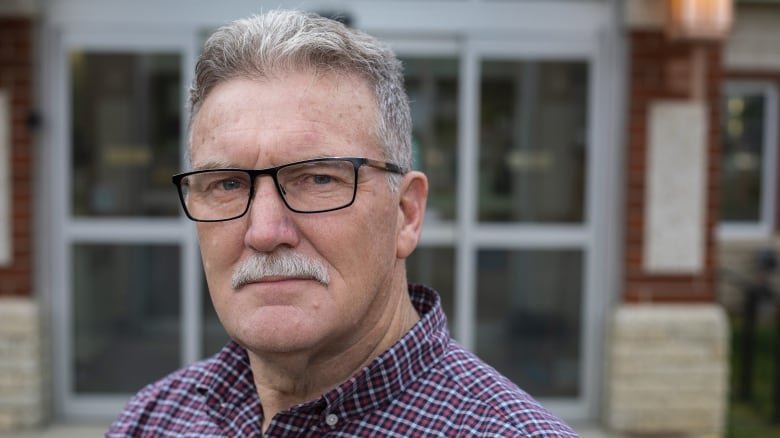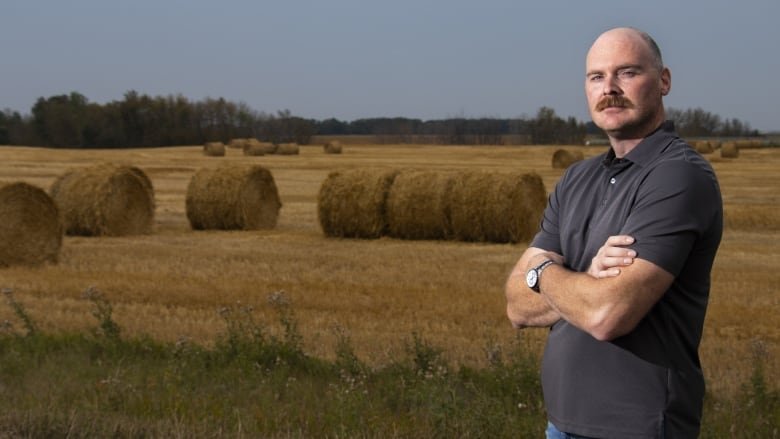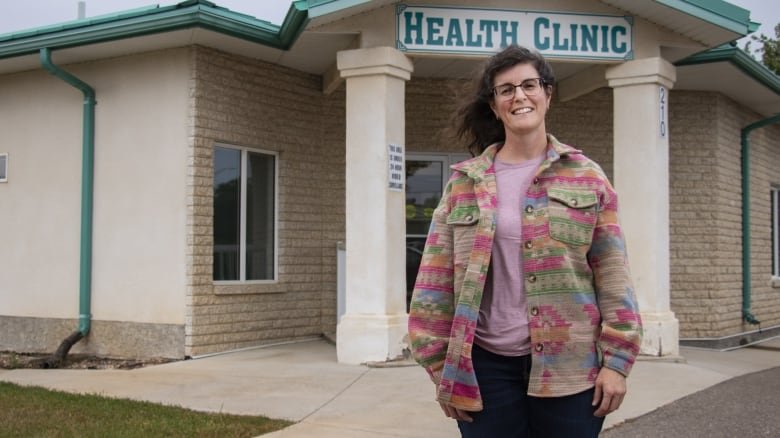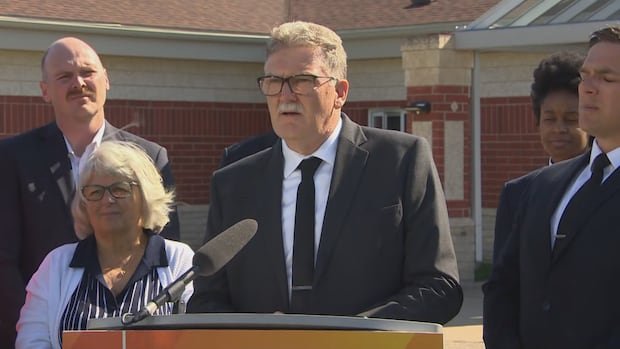
The town of Carberry, Man., is doing everything it can to keep its emergency room open, after it was forced to close in 2023. And so far, it’s worked.
“We really said, ‘You can’t forget Carberry,'” Mayor Ray Muirhead told White Coat, Black Art host Dr. Brian Goldman.
“We weren’t giving up. We weren’t sitting back hoping that Prairie Mountain Health would find us a doctor. We made sure that we were out there.”
Carberry, a town of fewer than 2,000 people, is one of many rural communities across Canada that has struggled to keep doctors, and seen its 10-bed emergency room closed for long stretches of time.
In 2024, CBC News reported numerous ER closures in British Columbia, Alberta, Ontario, Quebec, P.E.I. and Manitoba, often linked to staff shortages.
But in May, Muirhead stood next to Manitoba Premier Wab Kinew as they announced Carberry Health Centre’s emergency room would reopen, thanks to a rotating staff of locum doctors, or substitutes. It has also since hired two full-time doctors.
It took a great deal of self-advocating from the entire community to revive what was once a thriving hospital, Muirhead says. And he believes the work is far from over.
The need
The town of Carberry hit a crisis point when the Carberry Health Centre’s emergency room closed in August of 2023, after its last physician’s contract expired.
“There was a rumble in the community. I mean, there was panic in some people,” said Muirhead.
Sherie Wray is one of two nurse practitioners who have done their best to provide health care without an ER in the area, working out of a walk-in clinic four times a week.
“It’s been very challenging and stressful. There’s a lot of people that have lost their primary care providers and it’s been a big job to fill,” said Wray, who has lived and worked in Carberry for the past 15 years.
She starts her day at 7:00 a.m., and will stay as late as 6:30 p.m.
“There’s never enough time to do everything,” said Wray. “It’s been a challenge to get patients in, to see them as timely as I’d like to.”

Grady Stephenson, chief administrative officer of the town of Carberry, has lived in the area most of his life. He’s seen firsthand the challenges that come from not having an open emergency room.
Stephenson’s father-in-law had a number of health complications that had him in and out of the hospital with multiple surgeries. He’s doing well now, but during that time, there was no emergency room open in Carberry. They either had to go to the nearby community of Brandon, or to Winnipeg.
During one of those emergencies, it took an hour and a half from when they called the ambulance to when his father-in-law made it to a hospital, instead of the quick drive to Carberry’s ER.
“Knowing that’s going on for our residents and our community members … and anybody that goes through our area, that is a huge concern for us,” said Stephenson.
“It can be detrimental and can have a very, very poor outcome for people.”
What it used to be
Loretta Oliver moved from Winnipeg to Carberry nearly 50 years ago to work at the hospital. As a technician, she did everything from operating the X-ray machine to running electrocardiograms.
In 1976, she says, the hospital was flourishing.
“The hospital was just an absolute hive of activity. It was so, so busy,” said Oliver.
There were three doctors and many staff running the 30-bed hospital. And, she says, the doctors were taking such good care of their patients.
Carberry Mayor Ray Muirhead said his community was relieved to hear its emergency room can reopen now that three doctors have been hired to staff it in rotation. The ER was closed last August due to physician staffing shortages.
But in the 1990s, according to Oliver, it started to slip with the arrival of regionalization. Instead of being able to hire who they needed, when they needed, the regional health authority took on that responsibility.
Staff started leaving, and they weren’t replaced. By then, Oliver had gone to school and became a nurse. There were times she would have to work two or even three 12-hour shifts in a row. She says she did that three different times.
“That’s when I decided I have to leave here,” said Oliver. She eventually left the job.
In the last year, Carberry’s hospital was forced to close 10 times, for a total of 141 days. Many rural hospitals continue to struggle across Canada, as they battle to recruit staff, up against higher-paying jobs in big cities. Hospitals also lost significant staff because of the COVID-19 pandemic, which led to burnout and frustration for many.
Taking action
When Carberry’s ER closed in 2023, the community committed to finding a solution. And for Muirhead, it quickly became an all-consuming job.
“Finding doctors, as you’re well aware, it’s not easy. You have to get them to a small community. You have to do whatever you have to do and you have to cross all the hurdles in between,” he said.
He set out to be the squeaky wheel. He did interviews with media as often as he could, and was constantly calling Prairie Mountain Health, the regional health authority.
“I’m sure the then-CEO of Prairie Mountain Health was getting sick and tired of me.”
It was provincial election time in Manitoba, and Muirhead connected with NDP Leader Kinew. Once Kinew was elected premier, Muirhead tried to get a meeting with him about the community’s situation.

“He said, ‘If you want to come to Virden, we will meet you at Tim Hortons,'” said Muirhead.
“Me and Grady [Stephenson, the chief admin officer] … we jumped in his vehicle and we drove to Tim Hortons on New Year’s Day. And we sat and we talked to him.”
And it wasn’t just working the phone lines. The community has also worked to advertise Carberry as a desirable place to live and work.
The town bought property across the street from the hospital, and plans to turn it into a place where hospital staff can stay the night if they just need a place to rest, or if there is a bad winter storm and they can’t get home.
Other communities
Though Loretta Oliver left the front lines, she became a champion for health care in the community. She’s now the chair of the Health Action Committee.
When Carberry was trying to work with the provincial health minister to get the ER reopened, she tried to sweeten the deal, offering a hug and homemade cookies.
On May 10, 2024, the community gathered in front of the Carberry Health Centre to celebrate its ER’s return, and Oliver made good on that promise.
“The premier stood next to me and he took a bite of his cookie and he looked at me with such surprise and said, ‘These are really good cookies.’
“And I thought, ‘Well, I’m not going to give you really bad cookies.'”

It was a huge win for the community. But Muirhead says the work is far from over.
“It’s one of those things you don’t just sit back and then let happen. You’ve got to keep maintaining that,” the mayor said.
“As soon as somebody comes to town and they sign, let’s just say, a four-year agreement … that very first day they sign, you got to be looking toward the next four years.”
However, he says, Carberry doesn’t need to be an outlier, or the one good-news story among a list of bad.
“Any community out there can do what we did. My take on it is get your name out there.”

